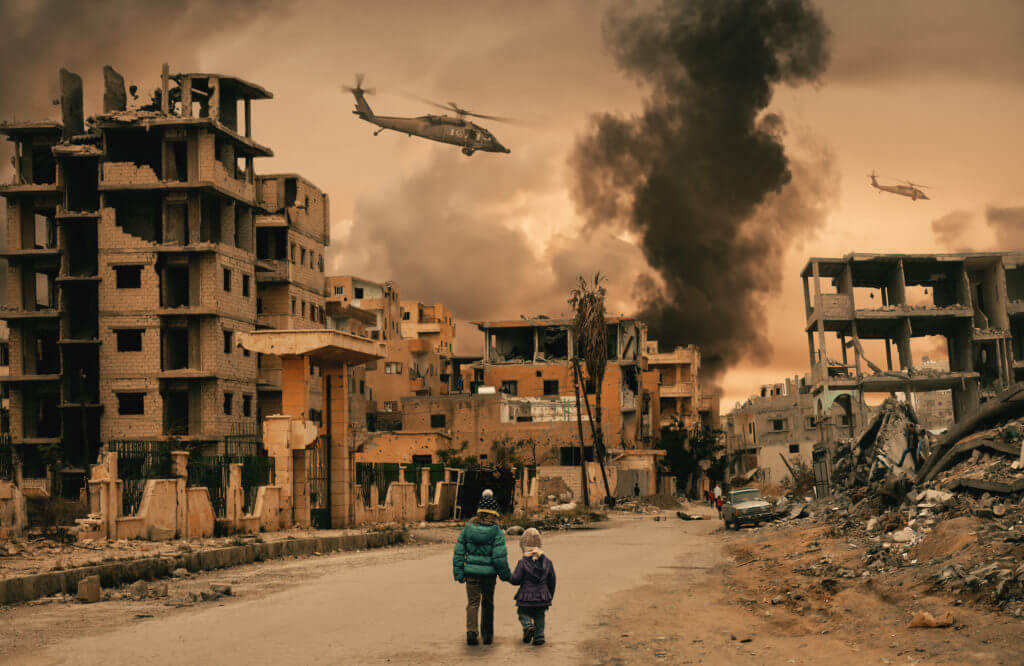You never know how talking about war might unlock a different view or perspective for both you and your kids. Beyond their personal development, your kids will benefit in their relationship with you as you show consistent empathy, understanding, and support for them.
A normal Thursday morning quickly morphed into a day full of uncertainty and worry for a seventh-grade girl. A few hours after arriving at school, Melissa walked to American History class overhearing hallway chatter of something unfamiliar. Her friends, and even some teachers, scrolled through their phones and whispered phrases like “war,” “invasion,” and “sanctions.” Melissa wasn’t used to hearing those conversations at school, so she could sense something was wrong.
As her teacher began class, she noticed an unusual headline across the screen. “Russia Invades Ukraine.” Melissa knew a few things about Russia, but she wasn’t quite sure where Ukraine was. After the bell rang, her teacher quieted the class and began explaining the news article.
While he spoke, Melissa struggled to keep up. She tried her best to put the pieces together, but it didn’t make sense. A dictator. Murdering innocent people. Nuclear war. The potential of World War III.
Melissa felt overwhelmed and alone. Her friends were nodding along and continuing to whisper to each other. She didn’t know who could answer her questions, so she stayed silent and thought to herself: Is everything okay? Am I going to die too?
Where Do I Start?
Depending on your children’s age and stage of life, difficult conversations might occur at different times. Sometimes these topics arise organically in conversations at school or with friends. Other times, you can control these discussions with your kids in the safety and comfort of home.
Between the recent health pandemic, school shootings, and natural disasters, the past few years have provided a variety of difficult topics for children and parents to discuss. Some conversations are products of the moment, like the COVID-19 pandemic. Other topics stretch throughout generations and history. Unfortunately, war is one of those realities of human history that forces families to confront difficult issues.
Knowing how to talk to your kids about war is certainly a daunting task. With constant exposure through social media, it’s likely your kids interact with multiple opinions about news before you even get a chance to talk with them.
However, it’s important that you do. Perhaps even more important is that you begin by asking questions rather than immediately launching into a speech containing all of your opinions about war and government.
5 Principles to Use When Talking with Your Kids about War
Talking with your kids about war depends on their age, stage of life, and understanding of complex topics such as government, history, and leadership. Before you begin your conversation, consider how you will approach your child. Then, you can think through these 5 principles when talking to your kids about war.
1. Ask Questions
If you think your child is already exposed to conversations about war, find a quiet moment to check in with them. Maybe after dinner or before bedtime. In these moments, create a safe space for your kids to reflect and share their thoughts.
Ask questions like “What have you heard about ____?” Or “How does _____ make you feel?” Choose questions that are open-ended and allow your child to speak freely. In conversations about war, your goal should include understanding your child’s feelings and thoughts, as well as what they’re seeing and hearing.
2. Let Your Children Guide the Conversation
As you allow your child to ask questions, they will naturally guide the conversation. These check-in conversations allow you to fully grasp their understanding of war and the specific situations within.
Check-ins also allow you to debunk any misconceptions your children might have. This is critical in a world defined by social media. Sometimes, introducing visual elements such as a map can help your children picture the situation better. As you provide facts and context, ensure that you are still prioritizing your children’s thoughts and feelings above your own emotions and opinions on war issues.
3. Be Cautious about What You Show Your Kids
Even though you can’t always control what your kids see, you can limit their exposure to news and social media through appropriate boundaries. If you need a starting place, try to not let your kids experience the news without you.
As news outlets feature graphic content warnings and images, consider muting or turning off the TV in these moments. If there’s any terminology or war vocabulary that’s confusing to your kids, take the opportunity to provide definitions. If social media proves to be problematic for your older kids, have a conversation with them about what they’re seeing, who they’re following, and the why behind both.
4. Avoid Labels
In talking with our kids about war, it’s easier than you think to quickly slip into labelling one side as the “good guys” and the other as the “bad guys.” When your kids ask “why bad things happen” it’s critical to help them understand the difference between the bad thing that happened, and the people involved.
Labelling entire people groups or nations as “bad” or “evil” unnecessarily perpetuates fear or confusion for your kids. Regardless of the war or situation, not every single individual from that country or nation is involved with nor agrees with their country’s decisions.
Instead of choosing labels, be comfortable with using the phrase: “I don’t know.” As a parent, your honesty and admission of not knowing everything will prove far more valuable that attempting to have an answer for every single question from your kid. In situations where your child has a personal relationship with God or exposure to Christianity, this can create a perfect avenue to a conversation about sin and its impact on the world.
5. Focus on the “Helpers”
When something scary happens, there are always those who try to help. Especially in times of war, there are individuals committed to helping those in danger. Whether it’s simple gatherings of support or donation efforts, you can find stories focused on the positive service of those in need.
If you decide to watch the news with your children or read articles online, consider finding stories describing the positive actions of heroes and helpers. In the midst of violence, search for messages centered on hope and unity. Then, if the conversation leads this way, discuss how your family can also contribute your help.


















 0800 200 362
0800 200 362 support@family.org.nz
support@family.org.nz Rangiora, 7400, New Zealand
Rangiora, 7400, New Zealand